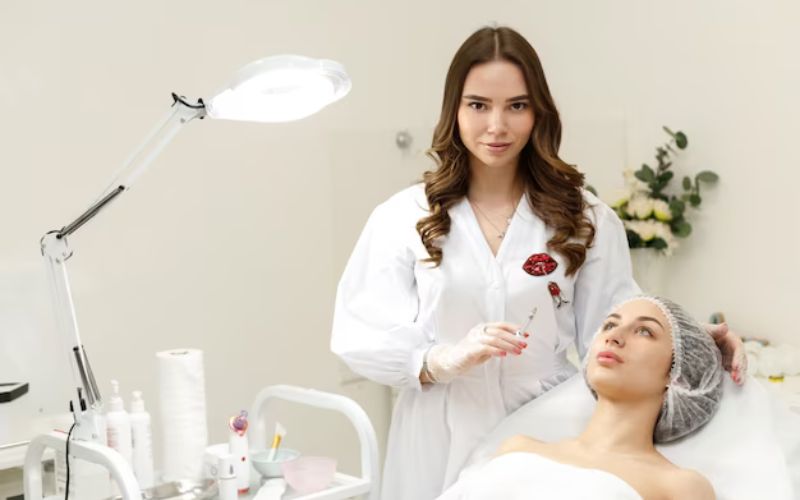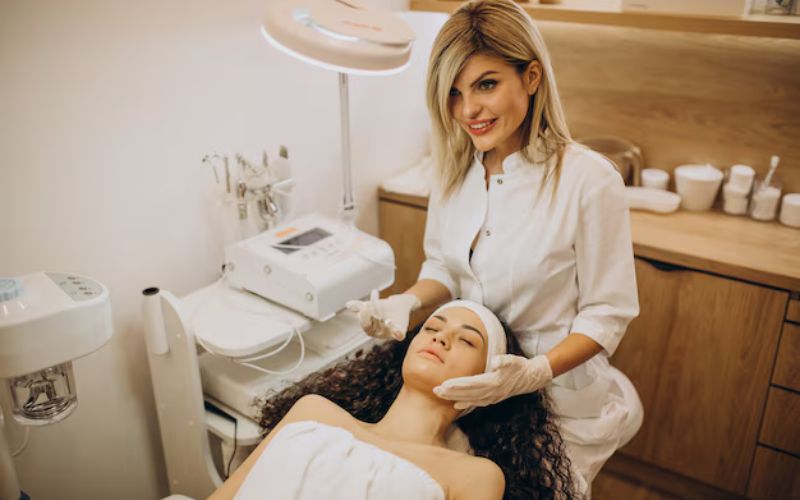Introduction
Maintaining healthy skin is vital for overall well-being, and consulting a dermatologist can significantly impact your skin health. Dr. Vishal Brahmbhatt, a renowned dermatologist in Ahmedabad, provides expert care for various skin conditions, including comprehensive skin care treatment. This comprehensive guide explores the most common skin issues treated by specialists and when you should consider seeking professional help.
Understanding Dermatology
Dermatology is the medical specialty focused on diagnosing and treating skin, hair, and nail disorders. Dermatologists undergo extensive training to manage a wide range of conditions, ensuring patients receive the highest level of care. This field not only addresses medical conditions but also involves cosmetic treatments to enhance the appearance of the skin.

Common Skin Issues Treated by Dermatologists
Maintaining healthy skin is vital for overall well-being, and consulting a dermatologist can significantly impact your skin health. Dr. Vishal Brahmbhatt, a renowned dermatologist in Ahmedabad, provides expert care for various skin conditions. This comprehensive guide explores the most common skin issues treated by specialists and when you should consider seeking professional help.
Acne
Causes: Acne occurs when hair follicles become clogged with oil and dead skin cells due to hormonal changes, certain medications, diet, and stress.
Symptoms: Acne manifests as pimples, blackheads, whiteheads, cysts, and nodules on the face, chest, and back.
Types
Comedonal Acne: Blackheads and whiteheads.
Inflammatory Acne: Red, swollen pimples.
Cystic Acne: Severe, painful cysts.
Treatment: Dermatologists offer treatments such as prescription medications, chemical peels, and laser therapy to manage acne and prevent scarring.
Eczema
Causes: Eczema is a chronic condition often triggered by allergens, irritants, genetics, and stress.
Symptoms: Itchy, red, and inflamed skin, often with blisters or dry patches.
Types
Atopic Dermatitis: Common in children, associated with allergies.
Contact Dermatitis: Caused by direct contact with irritants or allergens.
Seborrheic Dermatitis: Affects oily areas like the scalp and face.
Treatment: Treatment includes topical steroids, moisturizers, and avoiding triggers. Severe cases may require immunosuppressants.
Psoriasis
Causes: Psoriasis is an autoimmune disorder where the immune system attacks healthy skin cells, accelerating skin cell production.
Symptoms: Red, scaly patches that are itchy and sometimes painful, often on the elbows, knees, and scalp.
Types
Plaque Psoriasis: Most common, with raised, red patches covered with a silvery scale.
Guttate Psoriasis: Small, drop-shaped lesions.
Inverse Psoriasis: Red patches in skin folds.
Treatment: Treatments include topical treatments, phototherapy, and systemic medications like biologics.

Hair Loss
Causes: Hair loss can result from genetics, hormonal changes, medical conditions, medications, and stress.
Symptoms: Thinning hair, bald patches, and excessive shedding.
Types:
Androgenic Alopecia: Male or female pattern baldness.
Alopecia Areata: Sudden, patchy hair loss.
Telogen Effluvium: Temporary shedding due to stress or illness.
Treatment: Dermatologists may prescribe medications like minoxidil and finasteride, and treatments like PRP therapy.
Rosacea
Causes: The exact cause of rosacea is unknown, but it involves a combination of genetic and environmental factors. Triggers include hot drinks, spicy foods, alcohol, and stress.
Symptoms: Persistent redness, visible blood vessels, and pimples on the face.
Types
Erythematotelangiectatic Rosacea: Redness and visible blood vessels.
apulopustular Rosacea: Redness with pimples.
Phymatous Rosacea: Thickened skin, often on the nose.
Treatment: Treatments include topical and oral medications, laser therapy, and lifestyle modifications.
Vitiligo
Causes: Vitiligo occurs when the cells that produce melanin die or stop functioning. The exact cause is unknown, but it may involve an autoimmune component.
Symptoms: Loss of skin color in patches, which can occur anywhere on the body.
Treatment: Options include topical steroids, light therapy, and surgical procedures like skin grafting.
Dermatitis
Causes: Dermatitis can be caused by allergens, irritants, genetic factors, and immune system dysfunction.
Symptoms: Red, itchy, and inflamed skin, sometimes with blisters or oozing.
Types
Contact Dermatitis: Resulting from contact with irritants or allergens.
Atopic Dermatitis: Linked to allergies and asthma.
Seborrheic Dermatitis: Affects oily areas like the scalp and face.
Treatment: Treatments include topical steroids, moisturizers, and identifying and avoiding triggers.
Warts
Causes: Warts are caused by the human papillomavirus (HPV). The virus triggers rapid growth of cells on the skin’s outer layer.
Symptoms: Small, grainy skin growths, often on the hands and feet.
Types
Common Warts: Typically on hands.
Plantar Warts: On the soles of the feet.
Flat Warts: Smaller and smoother, often on the face.
Treatment: Treatments include cryotherapy, salicylic acid, and laser therapy.
What to Expect During a Dermatology Visit
When you visit Dr. Vishal Brahmbhatt or any top skin specialist in Ahmedabad, the process typically includes:
Initial Consultation: Detailed medical history and thorough skin examination.
Diagnosis: Assessment leading to diagnosis and treatment options.
Treatment Plan: Prescription creams, oral medications, in-office treatments like chemical peels or laser therapy, and follow-up visits for monitoring.
While seeing a top skin doctor in Ahmedabad is essential for treating skin conditions, preventive care can help maintain healthy skin
Sun Protection: Use broad-spectrum sunscreen with SPF 30 or higher daily and wear protective clothing when outdoors.
Healthy Lifestyle: Eat a balanced diet rich in antioxidants, vitamins, and minerals. Stay hydrated by drinking plenty of water.
Skin Care Routine: Use gentle cleansers suitable for your skin type and apply moisturizer regularly to keep your skin hydrated and healthy.
Frequently Asked Questions (FAQ)
To find the best dermatologist in Ahmedabad, you can start by asking for recommendations from friends, family, or healthcare professionals. You can also search online for reviews and ratings of dermatologists in the area. Websites and directories specific to healthcare can provide valuable information.
Conclusion
Understanding the difference between a skin doctor and a dermatologist is crucial for making informed decisions about your skin health.
Dr. Vishal Brahmbhatt Dermatologists offer specialized training and expertise that general skin doctors may lack, making them the best choice for comprehensive and effective skin care. For anyone seeking expert dermatological care, consulting the best dermatologist in Ahmedabad ensures you receive the highest quality of care tailored to your specific needs.

